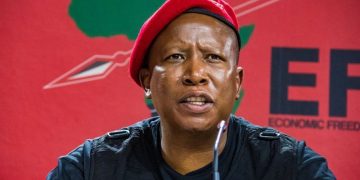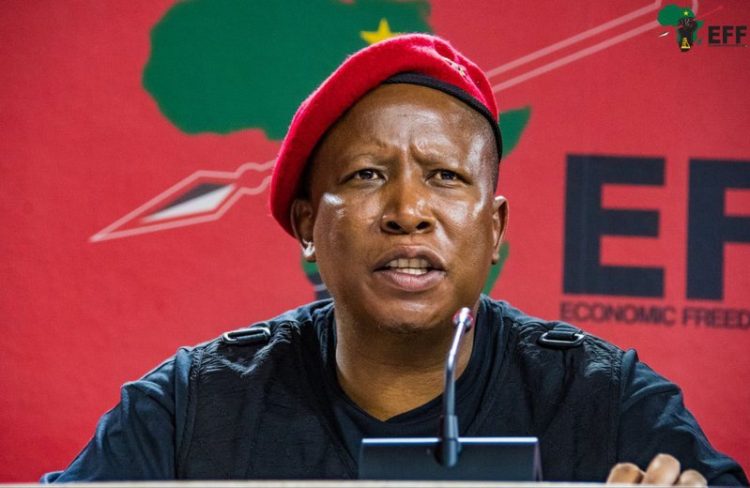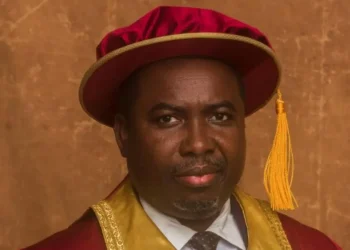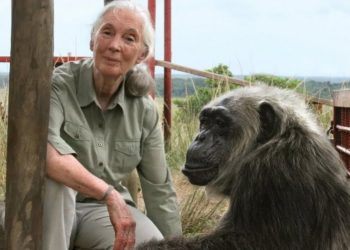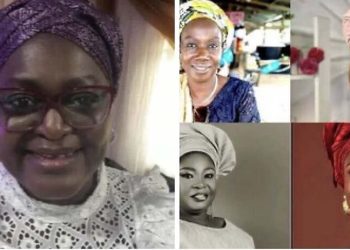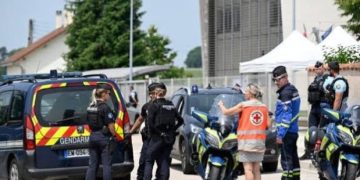Who is Julius Malema?
Julius Malema, a name that ignites both fervent loyalty and fierce controversy across South Africa’s political landscape, stands as a towering figure whose fiery oratory and radical vision for economic emancipation have reshaped the nation’s discourse, galvanizing disenfranchised youth while unsettling the establishment.
Born Julius Sello Malema on March 3, 1981, in the impoverished township of Seshego, Limpopo, this Northern Sotho activist rose from humble roots to lead the African National Congress Youth League (ANCYL) and, after a dramatic 2012 expulsion, founded the Economic Freedom Fighters (EFF), a far-left populist party that has become South Africa’s third-largest political force.
At 44, Malema’s journey from a childhood marked by his mother’s struggles to a polarizing parliamentarian advocating land reform and nationalization, reflects an unyielding drive, positioning him as a transformative yet divisive icon as of May 5, 2025.
This Julius Malema’s biography focuses on the tumultuous ascent of a leader whose rhetoric and red-beret-clad movement have redefined South Africa’s post-apartheid struggle, offering a lens into the fusion of personal hardship, political audacity, and pan-African ambition that fuels his influence.
From his early activism at age nine to his ANCYL presidency, marked by provocative calls to “kill for Zuma,” to the EFF’s rise as a parliamentary disruptor, Malema’s career is a saga of defiance and reinvention, punctuated by hate speech convictions, legal battles, and a growing electoral footprint.
His path, shaped by academic perseverance, family ties, and financial controversies, carries both revolutionary zeal and polarizing fallout.
What follows is a deep exploration of his early years, pre-political roots, meteoric career, major achievements, personal life, and the evolving legacy of a “Commander-in-Chief” whose voice continues to echo from Seshego’s townships to Africa’s capitals, challenging the status quo with every impassioned word.
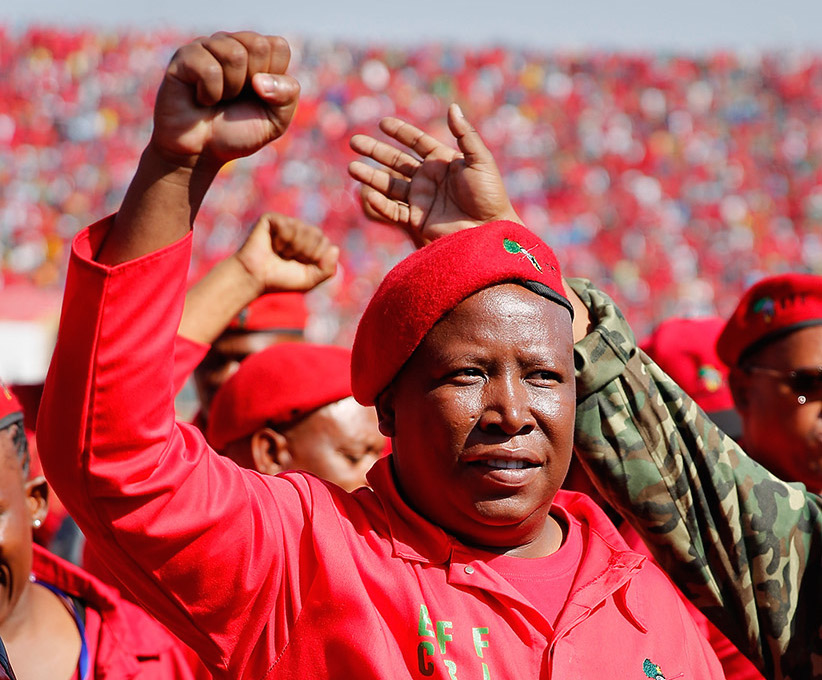
Malema’s Bio-Data
| Name | Julius Sello Malema |
| Date of Birth | March 3, 1981 |
| Age | 44 years old |
| Place of Birth | Seshego, Limpopo, South Africa |
| Occupation | Politician, Activist |
| Current Position | Commander-in-Chief and President of the Economic Freedom Fighters (EFF), Member of the South African National Assembly |
| Net Worth | Estimated at $3 million USD (approximately R45 million, based on parliamentary salary, business interests, and alleged donations) |
| Source | Bsgistnews.com |
Early Life and Education
Julius Sello Malema was born on March 3, 1981, in Seshego, a segregated black township near Polokwane, Limpopo, South Africa, then part of the Transvaal.
Raised in poverty by his single mother, Flora Mahlodi Malema, a domestic worker, and later his grandmother Sarah after Flora’s death from epilepsy, Malema grew up in a Northern Sotho family facing post-apartheid inequalities.
His mother’s struggles profoundly shaped his political consciousness, fueling his advocacy for economic justice.
Little is known about his biological father, though claims by individuals like Samuel Manyapye in 2012 were denied by Malema, who grew up without a father figure.
Malema attended Mohlakaneng High School in Seshego, where his academic performance was uneven, reportedly failing two grades and scoring low in subjects like mathematics (H, sub 33%) and woodwork (G, sub 40%), though the ANC Youth League contested the legitimacy of these publicized results.
Despite challenges, he graduated and pursued higher education at the University of South Africa (UNISA), earning a two-year diploma in Youth Development in 2010 and a Bachelor of Arts in Communications and African Languages in 2016.
In 2017, he completed a BA Honours in Philosophy at UNISA, and in 2018, he enrolled in a master’s program at the University of the Witwatersrand, reflecting his commitment to education as a tool for leadership.
What was Julius Malema’s Career Before Political Prominence?
Malema’s political activism began at age nine or ten, joining the Masupatsela (“Trailblazers”) movement of the African National Congress (ANC), where he claims to have removed National Party posters during South Africa’s transition to democracy.
At 13, he alleged receiving military training with the ANC’s armed wing, a claim disputed for lack of evidence.
By 14, in 1995, he was elected chairperson of the ANC Youth League (ANCYL) branch in Seshego and the regional Capricorn branch.
In 1997, he became provincial chairperson of the Congress of South African Students (COSAS) in Limpopo, and in 2001, he was elected COSAS national president.
His 2002 COSAS-led student march in Johannesburg drew criticism for violence and looting, marking his early penchant for bold, disruptive activism.
These roles honed his oratory skills and militant persona, setting the stage for his national ascent.
Malema’s Political Career
Malema’s national prominence surged in April 2008 when he was elected ANCYL president in a contentious conference marred by allegations of voter intimidation.
A vocal supporter of ANC deputy president Jacob Zuma, Malema declared he would “kill for Zuma” and sang liberation songs like “Dubul’ ibhunu” (“Shoot the Boer”), drawing widespread condemnation for inciting violence.
His advocacy for nationalizing South Africa’s mines and expropriating land without compensation positioned him as a radical voice, appealing to disenfranchised black youth.
His provocative statements, including a 2009 claim that a woman who accused Zuma of rape had a “nice time,” led to a 2010 hate speech conviction, with a R50,000 fine and mandated apology.
In 2011, he was convicted again for singing “Shoot the Boer,” deemed racially inflammatory.
His relationship with Zuma soured as Malema criticized the ANC’s economic policies, accusing Zuma of betraying the poor.
Disciplinary actions culminated in his expulsion from the ANC in April 2012 for bringing the party into disrepute, particularly after campaigning against Zuma’s leadership.
Undeterred, Malema founded the Economic Freedom Fighters (EFF) in July 2013, a far-left, populist party advocating economic emancipation, land reform, and anti-capitalist policies.
Elected to the National Assembly in 2014 with 25 seats, the EFF grew to become South Africa’s third-largest party by 2024, known for its red berets, military-style ranks (Malema as “Commander-in-Chief”), and disruptive parliamentary tactics, including fistfights and walkouts.
Malema’s EFF has set policy agendas, notably pushing for land expropriation and challenging the ANC’s left flank.
His 2021 Pan-African Parliament session threat to “kill” a Malian MP and his 2023 rally chants of “Kill the Boer” sparked global controversy, with figures like Elon Musk accusing him of stoking racial tensions.
Despite this, Malema’s focus on black youth and pan-Africanism has earned him a loyal following, amplified by speeches in Ghana, Liberia, and Kenya, where he criticized leaders like William Ruto in 2023.
Major Achievements
Malema’s achievements blend political influence with controversy.
Founding the EFF in 2013 transformed South Africa’s political landscape, securing 6% of the vote in 2014 and growing to a major opposition force by 2024, with polls suggesting potential kingmaker status in future elections.
His educational journey, earning a BA and Honours degree while leading the EFF set a trend among politicians, emphasizing academic credentials.
His oratory and social media presence have made him a visible figure, with the EFF’s red boiler suits symbolizing solidarity with laborers. Internationally, his pan-African advocacy has resonated, earning praise from figures like Kenya’s PLO Lumumba for articulating youth issues.
However, his two hate speech convictions (2010, 2011) and polarizing rhetoric remain divisive.
Personal Life
Malema married Mantwa Matlala in a private ceremony in Seshego in December 2014, under heavy security.
They have two sons, Munzhedzi (born 2016) and Kopano (born 2018).
He also has a son, Ratanang, from a previous relationship with Maropeng Ramohlale.
Based in Sandton, Johannesburg, Malema’s lifestyle, marked by luxury cars, Swiss watches, and champagne has drawn scrutiny, with a 2021 report linking his Hyde Park residence to cigarette businessman Adriano Mazzotti, who donated R200,000 to the EFF and loaned Malema R1 million.
Malema denied ownership, claiming his wife rented the property.
His 2013 arrest for speeding at 215 km/h and a 2012 fraud, money laundering, and racketeering case (dismissed in 2015) fueled perceptions of corruption, though he maintains these were politically motivated.
His 2013–2015 tax debt of R16.1 million, partially settled, added to financial controversies.
Legacy and Impact
At 44, as of May 5, 2025, Julius Malema’s net worth is estimated at $3 million (roughly R45 million), derived from his MP salary (R1.43 million annually), business interests, and alleged donations, though financial opacity persists.
His legacy is a paradox: a hero to disenfranchised black youth for championing economic freedom and land reform, yet a polarizing figure accused of reckless populism and racial divisiveness by critics, including the Democratic Alliance and AfriForum.
The EFF’s growth, from 25 seats in 2014 to a potential coalition player, underscores his influence, especially among South Africa’s youth (median age 28).
His 2010 Time’s Least Influential People listing contrasts with Forbes’ 2011 “10 Youngest Power Men in Africa” nod, reflecting his divisive impact.
Malema’s EFF has exposed ANC vulnerabilities, pushing radical policies that resonate in townships but alarm investors and white communities.
His 2010 Zimbabwe visit praising Robert Mugabe and 2021 tweet celebrating F.W. de Klerk’s death highlight his defiance, while his hate speech convictions and legal battles, most recently AfriForum’s 2018 private corruption prosecution attempt, underscore ongoing scrutiny.
As South Africa approaches future elections, Malema’s role as a potential kingmaker looms large, his fiery rhetoric and pan-African vision a double-edged sword.
Whether history views him as a revolutionary or a destabilizer, Malema’s imprint on South Africa’s political and social fabric is undeniable, a Seshego-born trailblazer whose red beret continues to stir both hope and fear.
Conclusion
Julius Malema’s electrifying journey through South Africa’s political arena stands as a vivid chronicle of defiance, resilience, and unrelenting ambition, a narrative that arcs from the impoverished streets of Seshego to the commanding heights of the Economic Freedom Fighters (EFF), a movement that has reshaped the nation’s post-apartheid discourse.
Born on March 3, 1981, Julius Malema transformed personal hardship, marked by his mother’s struggles and early loss into a fiery crusade for economic justice, rising from a teenage ANC activist to a polarizing parliamentarian whose red berets and radical calls for land reform and nationalization have galvanized millions while sparking fierce opposition.
At 44, with a net worth estimated at $3 million and the EFF poised as a potential kingmaker in future elections, Malema’s influence as of May 5, 2025, underscores his role as both a revolutionary beacon and a contentious lightning rod.
His legacy is a mix of transformative achievements and divisive controversies.
Founding the EFF in 2013, Julius Malema built South Africa’s third-largest party, securing a growing electoral base and setting agendas on land expropriation that challenge the ANC’s dominance.
His academic growth, earning a BA, Honours, and pursuing a master’s paired with his pan-African speeches in Ghana and Kenya, has inspired a generation, particularly black youth, while his hate speech convictions in 2010 and 2011, alongside 2023’s “Kill the Boer” controversy, have drawn global scrutiny.
Financial opacity, from tax debts to alleged ties with figures like Adriano Mazzotti, and legal battles, including a dismissed 2012 fraud case, add complexity to his narrative, yet his oratory and social media savvy keep him a central figure, lauded by allies like PLO Lumumba and vilified by critics like AfriForum.
On a personal level, Julius Malema remains a devoted family man, married to Mantwa Matlala, father to three sons, whose Seshego roots and Northern Sotho heritage infuse his rhetoric with authenticity, even as his Sandton lifestyle fuels accusations of hypocrisy.
Residing in Johannesburg, he navigates fame with a blend of charisma and defiance, his speeding arrests and luxury watches contradicts his township rallies.
As of May 5, 2025, Julius Malema stands at a pivotal crossroads, his EFF’s electoral gains and pan-African vision poised to shape South Africa’s future, his radicalism a double-edged sword that could either cement his revolutionary status or deepen societal divides.
Whether history will remember him as a liberator of the marginalized or a populist provocateur, Julius Malema’s impact from Limpopo’s dust to parliament’s chaos is indelible, a legacy of red berets and unyielding conviction that continues to stir South Africa’s soul, one fiery speech at a time.
FAQs on Julius Malema
Q. Who is Julius Malema?
Julius Malema is a South African politician and activist, born Julius Sello Malema on March 3, 1981, in Seshego, Limpopo. He is the Commander-in-Chief and President of the Economic Freedom Fighters (EFF), South Africa’s third-largest political party, known for advocating land reform, nationalization, and economic emancipation for black South Africans.
Q. What is Julius Malema’s current position?
As of May 5, 2025, Julius Malema serves as the President of the EFF and a Member of the South African National Assembly, leading the party’s radical left-wing agenda and pushing for policies like land expropriation without compensation.
Q. Why is Julius Malema controversial?
Julius Malema is polarizing due to his provocative rhetoric, including singing “Shoot the Boer” (resulting in 2010 and 2011 hate speech convictions) and 2023’s “Kill the Boer” rally chants, accused of inciting racial violence. His financial controversies, like a 2013–2015 R16.1 million tax debt and alleged ties to businessman Adriano Mazzotti, also fuel debate.
Q. What is Julius Malema’s net worth?
Julius Malema’s net worth is estimated at $3 million USD (approximately R45 million) as of May 5, 2025, derived from his parliamentary salary (R1.43 million annually), business interests, and alleged donations, though exact figures remain unofficial and contested.
Q. What is the Economic Freedom Fighters (EFF) led by Julius Malema?
The EFF, founded by Julius Malema in 2013 after his expulsion from the ANC, is a far-left populist party advocating for economic justice, land reform, and anti-capitalist policies. Known for its red berets and disruptive parliamentary tactics, it’s South Africa’s third-largest party, with growing influence among youth as of 2025.
